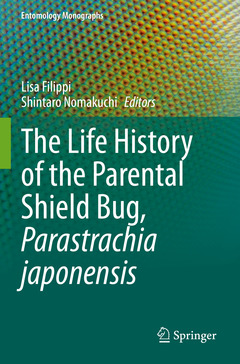The Life History of the Parental Shield Bug, Parastrachia japonensis, 1st ed. 2022 Entomology Monographs Series
Coordonnateurs : Filippi Lisa, Nomakuchi Shintaro

This book presents the discoveries made during nearly three decades of research on the parental shield bug, Parastrachia japonensis inhabiting Kyushu Island, Japan. P. japonensis has evolved a unique and fascinating life history, characterized by extreme behavioral and physiological adaptations that have culminated in a singularly dependent relationship with its lone host tree, Schoepfia jasminodora (Olacaceae), which is a generally scarce and unreliable resource.
It is expected that the evolution of parental care behaviors in the strictly semelparous P. japonensis was more directly influenced by the benefit to females that arises from enhanced survivorship of current offspring, rather than any possible cost the females might incur in terms of reduced future reproductive success, because no future reproduction is possible. The authors explain how the different parental cares in this species enhance offspring survivorship in the context of the ecological conditions it has experienced over evolutionary time.
The book begins with a recap of the earliest studies, the reports through 1991, and then introduces the many fascinating aspects of the life history, neurobiology, physiology and behavior of P. japonensis that have been newly discovered since, and those aspects that have been confirmed through experimentation over the past thirty years. This comprehensive review of information will be useful for comparative studies of parental care in other semelparous and iteroparous organisms experiencing both similar and different ecological constraints. The book will be of academic interest to undergraduate and graduate students of entomology, zoology, behavior, and behavioral ecology.
Dr. Shintaro Nomakuchi earned his Doctoral degree investigating reproductive behavior of the damselfy, Mnais pruinosa. His P. japonensis research began in 1993 when he joined the faculty of Saga University in Japan. In addition to teaching and supervising an army of undergraduate and graduate students investigating P. japonensis and four provisioning Japanese cydnids, Dr. Nomakuchi translated into Japanese, either alone or with others, three biostatistics texts, a seminal text on dragonflies, and An Introduction to Behavioural Ecology (Davies, Krebs and West, 2012). He is currently Professor Emeritus of Agriculture at Saga University and lives with his family in New York.
Date de parution : 10-2023
Ouvrage de 272 p.
15.5x23.5 cm
Date de parution : 10-2022
Ouvrage de 272 p.
15.5x23.5 cm



